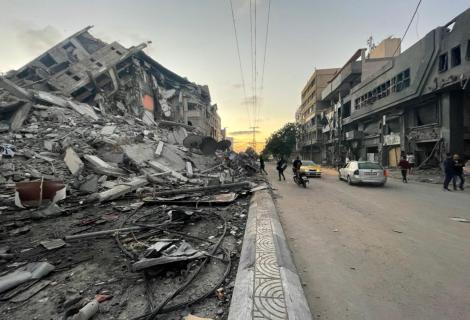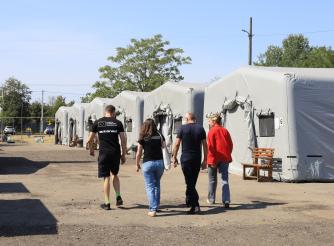Fourteen years of blockade has left two million Gazans living in an ‘open air prison’

By Riham Jafari, communications coordinator at ActionAid Palestine
In 2015, the United Nations warned that Gaza could become 'uninhabitable' by 2020 due to the ongoing blockade shattering its ability to export goods and escalations in violence reversing development efforts.
This month marks 14 years since the start of the blockade which came into force on 14 June 2007 and the UN’s prediction is a reality for many Palestinians in Gaza, who are living with soaring levels of unemployment, dire economic conditions and growing insecurity.
Two million people are living under siege-like conditions, in violation of international law and with no end in sight.
Israel first imposed movement restrictions on the Gaza Strip in the early 1990s. These intensified in June 2007, after Hamas took control of this section of the occupied Palestinian territories. At this point Israel, with Egypt, imposed a full land, sea and air blockade on the territory.
Since the start of the blockade, Israel has launched four attacks on Gaza (2008, 2012, 2014 and 2021). These escalations of violence have worsened Gaza’s already dire situation. Thousands of Palestinians have died in Israeli bombardments, including many children. Tens of thousands of homes, schools and office buildings have been destroyed.
The anniversary of the blockade comes only weeks after the latest airstrikes in which 256 Palestinians, including 66 children and 40 women, were killed.
Rebuilding Gaza is being slowed by Israel’s restrictions on the importation of building materials.
Fourteen years of Israeli blockade have had a devastating effect on Gaza’s population. The blockade is responsible for shortages of essential goods and has plunged tens of thousands of people into unemployment. More than half of people in Gaza (56 per cent) are living in poverty and youth unemployment stands at 63 per cent. More than two-thirds of the population are food insecure, according to the Palestinian Central Bureau of Statistics.
More than 95 per cent of Gaza’s water is unsafe to drink, according to the UN. Facilities to provide clean water and electricity depend on materials and spare parts which cannot be imported due to the blockade.
Gazans effectively live in an open-air prison. They can’t enter or leave Gaza freely, to see family or friends. Israel also controls the coastal waters where Gazans are allowed to fish.
As the occupying power in Gaza, Israel has an obligation to ensure the welfare of the population it controls, including adequate provision of health, electricity, water and other basic services.
The international community must act urgently to pressure Israel to lift the blockade and stop the separation of the West Bank and the Gaza Strip.


